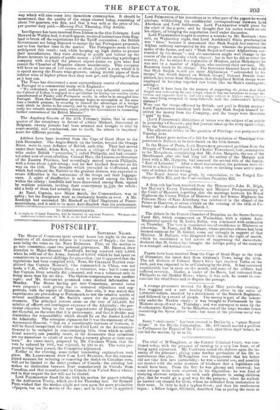POSTSCRIPT.
SATURDAY NIGHT.
The House of Commons spent several hours last night in the most desultory of all desultory debates in Committee of Supply ; the busi- ness being the votes on the Navy Estimates. First, on the motion to go into committee, came two personal grievances. Mr. BERNAL drew attention to Major- General Woodford's having received only 4,5001. when he sold out of the Army, instead of 9,0001. which he had spent on commissions in several shiftings for promotion : but it appeared that the regulations had been complied with. Next, Sir CHARLES NAPIER com- plained that Captain Maunsell, who commanded in China, was not made a C.B., while Captain Grey, a volunteer, was : but it came out that Captain Grey actually did command, and was a volunteer only in doing more than his set duty. The Opium-compensation was anoitlier topic ; and Mr. GOULBURN promised some desired information on Monday. The House having got into Committee, several votes were proposed ; each giving rise to scattered objections and sug- gestions, with the replies of Ministers. Inter alio it was stated that experiments are proceeding at Portsmouth to test the relative merits of several modifications of Mr. Smith's screw for the propulsion of steamers. The principal contest arose on the vote of 125,4591. for salaries of officers and contingent expenses of the Admiralty ; the par- ticular objection being to the new appointment of Deputy-Account. ant-General, on the score that it is unnecessary, and that it divides and diminishes the responsibility which should lie on the Junior Lord of the Admiralty. The strongest argument for it was the statement of the Accountant-General, " that, on a considerable increase of business, it will be found inexpedient for either the Civil Lord or the Accountant- General to be occupied in countersigning bills, from which no addi- tional security can possibly result, as the documents thus submitted are too numerous to admit of more than a cursory glance at their con- tents." An amen lment, proposed by Mr. CHARLES WOOD, that the vote be reduced by 100/., was rejected, by 124 to 45. The votes pro- posed having been passed, the Committee adjourned. Earlier in the evening, some rather interesting explanations took place. Mr. LABOUCHERE drew from Lord STANLEY, that the contem- plated measure for reducing or removing the ditties on Canadian corn, will not be limited to the strict produce of Canada : the existing law makes no distinction between flour manufactured in Canada from Canadian, and that manufactured in Canada from United States wheat ; and in that respect the law will not be altered. Lord PALMERSTON fixed for the 16th his motion for papers relating to the Ashburton Treaty, which stood for Thursday last. Sir ROBERT PEEL wished that the motion might not turn upon the mere production cfpapers, but on the merits of the case ; and in that view he apprized Lord Palmerston of his intentions as to what part of the papers be would produce, withholding the confidential correspondence between Lord Aberdeen and Lord Ashburton. Lord PatatEnerow •w6tild press for the whole of the pipers ; and he thought that his notice would secure his object, of bringing the negotiation itself under discussion.
Lord PALMERSTON sought to correct a mistake by Mr. Roebuck ; who said, on Wednesday night, that Lord Auckland's Simla proclamation was " false," because it announced that Shah Soojah had entered the Afghan territory surrounded by his troops ; whereas the proclamation spoke of the future, and said " Shah Soojah will enter Afghanistan sur- rounded by his troops" ; and circumstances might well change in the course of the six months which elapsed : but in fact he did so enter the country, for he raised five regiments of Hindoos, and at Shikarpore he was met by a number of Afghans, who tendered their services. Mr. ROEBUCK stuck to his charge. The Governor-General knew full well that Shah Soojah would not enter Afghanistan " surrounded by his troops," but would depend on British troops.; Colonel Dennie com- plained, in a letter from Shikarpore, that disciplined British troops were employed in keeping together raw levies like the Shah's contingent ; asking— "Could it have been for the purpose of supporting the fiction that Shah Soojali was restored by his own troops, when it was too notorious to escape de- tection and exposure that he had not a single subject or Afghan among them his army being composed of camp-followers from the commander's military
stations " Were not the troops officered by British, and paid in British money ? Lord PALMERSTON admitted both facts ; only Shah Soojah himself re- ceived the money from the Company, and the troops were therefore " paid" by him.
[Lord Palmerston's distinction of tenses was the subject of an article in yesterday's Chronicle; and that journal takes up the story again today, from the Viscount's speech.]
The adjourned debate on the question of Privilege was postponed till Tuesday next.
Lord ELIOT gave notice of a bill for the regulation of Municipal Cor- porations in Ireland, to be introduced on the 16th instant.
In the House of Peers, Lord BROUGHAM presented petitions from the Marquis of Townshend and Lord Charles Townshend, heir presumptive to the Marquisate, complaining that Mr. John Margetts, the son of the Marchioness after she had long left the society of the Marquis and lived with a Mr. Margetts, had assumed the second title of the family, " Earl of Leicester." After a short conversation, the petitions were re- ferred to a Select Committee, with a view to devising some active mea- sure of redress for the wrong. The Royal Assent was given, by commission, to the Forged Ex- chequer Bills Bill, and the Coal-venders Penalties Bill.


























 Previous page
Previous page